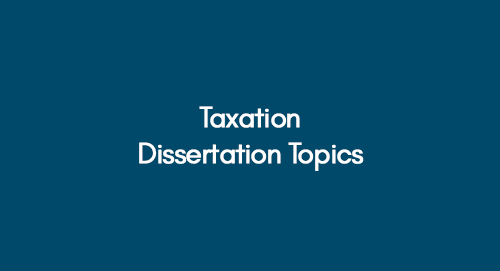
135+ Trending Neuroscience Dissertation Topics For Students
December 26, 2022
134+ Interesting Taxation Dissertation Topics For Research
December 26, 2022If you are searching for this information, you may be a psychology student struggling to write a dissertation. You are not alone. Many students find dissertations to be a challenging task. Psychology students have consistently ranked dissertation writing as one of the most stressful aspects of their degree. But why is writing a dissertation so tricky?
In this guide, we will explore some psychological reasons why dissertations are hard to write and offer some tips and psychology dissertation examples on making the process a little easier.
To have a better understanding, visit the psychology dissertation examples listed below;
Example: 1 Factors Influencing the Choice of Psychiatry
Example: 2 Impact of Brand Love on Consumer Buying Behaviour
5 Reasons Why Writing Psychology Dissertation is Hard
- The first reason why dissertations are so difficult to write is that they are usually quite long. The average length of a psychology dissertation is around 80 pages (APA, 2020). That is a lot of material to cover! When you are staring at a blank page (or screen), it can be overwhelming to figure out where to start.
- Writing a dissertation can be difficult because you must be very organized. A dissertation is not just one big paper; it is usually composed of several smaller articles that are all knitted together. It means that you must keep track of many different pieces of information and ensure that they all fit together coherently. For many students, this can be quite challenging.
- Lastly, dissertations are hard to write because they are essential to your degree. Your academic career has been leading up to this point, and now it is all riding on your ability to produce a high-quality dissertation. The pressure can be intense!
How to Ace Your Psychology Dissertation?
Fortunately, there are multiple things that you can initiate to make the process of writing a dissertation easier. Here are some tips:
1. Start Early
Giving yourself plenty of time to write your dissertation will help reduce stress and allow you more time for revision and editing.
2. Be Organized
Use a calendar or scheduling app to keep track of deadlines and progress on your dissertation. Breaking the task into smaller, manageable parts will make it less daunting.
3. Get Feedback
Ask your supervisor or fellow students to review your work and provide feedback. It will help you catch any errors or mistakes before it is too late.
4. Take Breaks
Taking breaks when writing your dissertation is important so you stay energized. Go for a walk, watch a movie, or read a book; make sure you come back refreshed and ready to work again!
5. Seek Help if Needed
If you struggle despite following these tips, feel free to seek professional help from a tutor or psychologist specializing in helping students with their academic writing skills.
Use Dissertation Examples to Jumpstart Your Writing Process
When you feel lost or stuck in the writing process, taking a step back and consulting psychology dissertation examples can be helpful. By looking at what other students have done in the past, you can better understand what is expected and what's possible in your dissertation. Here are a few tips for effectively using psychology dissertation examples:
- Choose several examples that align with your research interests. It will help you zero in on what is possible in your dissertation and get some ideas for structuring your work.
- Take some time to read through each example closely. As you read, note any particularly effective techniques or approaches that you'd like to emulate in your work.
- Feel free to modify or adapt what you see in the examples to fit your needs and style. The whole point is for you to find inspiration, not to copy someone else's work exactly.
Consulting psychology dissertation examples can be an effective way to jumpstart your work if you're stuck in the writing process.
5 Expert Suggestions to Craft a Mind-Blowing Dissertation
1. The Topic must be Researchable
A good psychology dissertation topic must be researchable, which means there should be enough previous research to form a solid foundation for your research. If there is more previous research, writing a comprehensive and well-informed dissertation will be easier. Additionally, the study must be up to date; if you are writing on a topic that has been researched extensively in the past but has yet to be researched recently, your dissertation may suffer as a result.
2. The Methodology must be Well Thought Out
Your dissertation will only be as good as your methodology. You must carefully consider the methods you will use to collect and analyze data and ensure that these methods are appropriate for your topic. If your methodology is flawed, your entire dissertation will be questioned.
3. The Argument must be Well Supported
For your dissertation to be successful, you need to make a strong argument supported by evidence from your research. This evidence can take many forms, including empirical data, case studies, or anecdotal evidence. Whatever form it takes, this evidence must be used effectively to make your argument convincing.
4. The Writing must be Clear and Concise
Your dissertation must be well-written to impress your committee members and earn a passing grade. It means the writing must be clear, concise, and error-free. It can be challenging to meet all of these requirements, but it is essential that you do if you want to write a successful dissertation. Fortunately, many resources (such as Dissertation Editing Services) can help you improve the clarity and conciseness of your writing.
5. You Must Adhere to the Guidelines
Dissertations are held to very high standards; not only must the quality of the research and writing be impeccable, but also the format and structure of the document must adhere to strict guidelines set forth by your university or department. These guidelines can vary significantly from one school to another, so you must familiarize yourself with the specific requirements before you begin writing. Failing to follow these guidelines could result in a lower grade or even rejection of your dissertation.
Conclusion
Overall, writing a dissertation can be a challenging but rewarding experience. By understanding some of the psychological challenges involved and following some helpful tips, you can set yourself up for success!
Get 3+ Free Dissertation Topics within 24 hours?



























